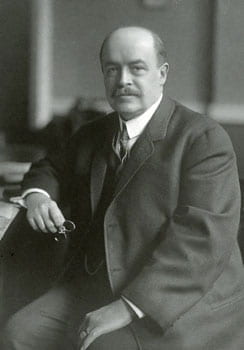Abram Winegardner Harris
 President
President
1906 – 1916
Born:
November 7, 1858
Philadelphia, Pennsylvania
Died:
February 21, 1935
Manset, Maine
Education: B.A., Wesleyan (1880); M.A., Wesleyan (1883)
Biography
Abram Winegardner Harris, the fourteenth president of Northwestern, must rank with that handful of leaders who made a decisive difference in the overall development of the University by virtue of their vision, nimbleness, longevity, and the scope of their ambition. Much was done on campus under his guidance, at a time when higher education throughout the country was entering a new era. As with the tenures of Henry Wade Rogers, Walter Dill Scott, J. Roscoe Miller, and Henry S. Bienen, the list of happenings and accomplishments studding his tenure is crowded and striking.
Harris was born on November 7, 1858, in Philadelphia, and received his B.A. in 1880, and his M.A. in 1883, from Wesleyan University. After teaching mathematics at Dickenson Seminary in 1880-1881, and at Wesleyan in 1881-1884, he took a year to study in Munich and Berlin. Upon his return Harris went back to Wesleyan, this time, no doubt having been exposed in Germany to a flourishing historical discipline, to teach history, in 1885-1888. Changing course again, in 1888 he became an assistant director, then director, at the Office of Experiment Stations in the U.S. Department of Agriculture. It was here that his considerable administrative talents first became evident, and it was from this position that he was offered the presidency of Maine State College, which he assumed in 1893. He was successful in this assignment too, overseeing the transformation of the school into the University of Maine in 1896, before leaving in 1901 to direct the Jacob Tome Institute, a preparatory school, in Maryland, until, after considerable success there too, he was wooed away by Northwestern in 1906.
In his first report to the trustees, Harris noted some glaring weaknesses around campus, including a sketchy curriculum and overcrowded classrooms, an inadequate library, and the lack of a proper gymnasium and adequate living quarters for undergraduate men. In marked contrast to the experience of the previous president, Edmund Janes James, who left the University prematurely in disappointment over the absence of support for just such measures from the same trustees, Abram Harris met with their ready acquiescence, perhaps because their experience with James had taught them that progress is not cost-neutral. With this assurance, Harris, a born administrator, proceeded to realize a series of initiatives in rapid succession.
In 1908 the School of Commerce was founded, and it was quickly a huge success. Also in 1908, Walter Lichtenstein was named University Librarian and within ten years under his tutelage the collection had greatly expanded. In 1909 a gift from the family of meatpacking notable Gustav Swift allowed for the construction of Swift Hall of Engineering, a state-of-the-art facility that must have enticed many potential faculty and students to Northwestern. The next year Patten Gymnasium was dedicated with generous help from trustee James A. Patten. This too was a lavish facility, located until 1939 at the present site of the Technological Institute; along with athletic activities, it accommodated commencement exercises and the North Shore Music Festival. In 1910, on Harris’s recommendation, the trustees upgraded graduate studies from the more archaic, loosely organized program, and established a Board of Graduate Studies to administer the school. In 1911 plans were drawn up to finally build, north of the new gym, the men’s dorms that a succession of presidents had been pushing for.
In 1913 the School of Oratory, formerly run by Robert Maclean Cumnock, petitioned to be put under the control of the Board of Trustees. By 1914, eleven units of what became the north quads were operating, with seven fraternities and four open houses occupying them. In the same year, Harris and the Board of Trustees organized the first summer school, expanded in 1915 to include a day school in Evanston. And in 1915 Harris Hall, the new liberal arts building named for the benefactor who funded it, banker and trustee Norman Wait Harris, was dedicated.
Generally, the Harris years saw a new professionalization of the Medical and Dental schools and an expansion of the Law school, while the student body of the Evanston campus increased dramatically; this was paced by a 30% rise in the University’s resources and the erection of 20 new buildings. Along with an improvement in the academic environment, relations with the city of Evanston warmed notably. Though the city in 1907 had tried to revoke Northwestern’s tax-exempt status, Harris convinced Evanston that the University’s fiscal contribution to the city greatly outweighed what the city would otherwise collect from non-University, taxable property.
Harris’s other triumphs as an administrator included his role as a creator, and first president, of Phi Kappa Phi, and creator of Alpha Delta Tau; as president of the American Social Hygiene Association, an early sex education group; as executive chairman of the Vice Commission in Chicago; as vice-president of the Committee of Fifteen; and as president of the Union League Club, among other public-spirited leadership accomplishments. And for good measure, it was Harris who conceived the idea of a water filtration plant for the city on land donated by Northwestern.
By the middle of 1916, Abram Harris seems to have been ready to relinquish the exhausting role of president, as he retired to accept a position as corresponding secretary of the Methodist Episcopal Board of Education, decidedly an easier post to bear. Here, of course, he was equally an asset to the organization.
Abram Winegardner Harris died on February 21, 1935, after several years of failing health.



